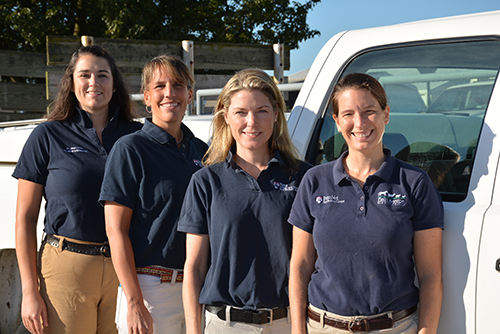[February 24, 2017; Kennett Square, PA] – New Bolton Center’s Equine Field Service experts, Drs. Liz Arbittier, Ashley Boyle, Jennifer Linton, and Meagan Smith, will each share details of complex cases from the field, highlighting their various specialties, as part of the First Tuesday Lecture series.
The presentation, “Tricky Cases from the Field: What’s Your Diagnosis?” will take place on Tuesday, March 7, at 6:30 p.m. in New Bolton Center’s Alumni Hall, 382 West Street Road, Kennett Square, PA. The lecture is free and open to the public. Due to limited seating, reservations are recommended and can be made by contacting Barbara Belt at beltb@vet.upenn.edu.
With advanced training and expertise, New Bolton Center’s Equine Field Service specialists bring the highest quality care directly to area farms, backed by the support of the hospital. During the First Tuesday Lecture, the team will showcase how their expert knowledge, state-of-the-art equipment, and compassionate care have helped in the diagnosis and treatment of complicated cases.
 Arbittier, Clinical Assistant Professor of Equine Field Service, will present the case of a lame performance horse, discussing diagnosis and treatment of a difficult yet common injury.
Arbittier, Clinical Assistant Professor of Equine Field Service, will present the case of a lame performance horse, discussing diagnosis and treatment of a difficult yet common injury.
Boyle, Assistant Professor of Medicine, will share the case of a horse with one-sided bloody nasal discharge, and the complex work-up required for diagnosis and treatment, including radiographs, endoscopy, and robotic CT scan.
Linton, Senior Fellow in Field Service and Reproduction, will review metabolic diseases that ponies and horses can develop, including Cushing’s Disease (PPID) and Equine Metabolic Syndrome.
Smith, Assistant Professor of Equine Field Service, will present several cases of horses that developed an extra molar, also known as supernumerary cheek tooth, which can be a mysterious cause of poor performance or mouth pain.
Spring First Tuesday Lecture Line-Up:
April 4: Dr. David Levine “Dynamic Endoscopy: The Airway in Action”
May 2: Dr. Andrew van Eps “Laminitis: Why Does It Occur? How Can We Better Manage It?”
June 6: Dr. Dean Richardson “The Recovery Pool: Defying Gravity after Orthopedic Surgery”
About the First Tuesday Lecture Series
The First Tuesday Lectures, free and open to the public, are presented September through December, and March through June. During the series, faculty and clinicians at New Bolton Center share current information on equine topics of interest to horse owners and caregivers. Many of the lectures highlight the advanced techniques performed by Penn Vet’s team of leading clinicians, and the state-of-the-art equipment and facilities available to ensure the best possible outcomes for patients.